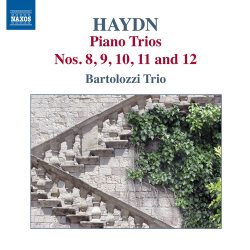| 
|
Franz Joseph HAYDN (1732-1809)
Piano Trios - Volume 4
Piano Trio in B flat major, Hob. XV:8 (1785) [12:52]
Piano Trio in A major, Hob. XV:9 (1786) [12:07]
Piano Trio in E flat major, Hob. XV:10 (1786) [10:08]
Piano Trio in E flat major, Hob. XV:11 (1789) [14:13]
Piano Trio in E minor, Hob. XV:12 (1789) [19:53]
Bartolozzi Trio (Matthew Truscott (violin), Richard Lester (cello), Simon Crawford-Phillips (piano))
rec. 5-7 Sept 2012, Concert Hall, Wyastone Leys, Monmouth, UK.
NAXOS 8.573128 [69:13]
Self-confessedly a man who composed not quickly, but ‘with great care and efforts’, Joseph Haydn is known as the father of both the symphony and the string quartet. On this CD, the Bartolozzi Trio perform Haydn’s less celebrated, but no less important, piano trios numbers 8-12.
Haydn’s naturally happy and cheerful temperament can be felt through these performances. Musicologist James Webster’s description of the composer’s public persona is a fitting depiction of the essence of this CD: ‘Haydn’s public life exemplified the Enlightenment ideal of the honest man: the man whose good character and worldly success enable and justify each other. His modesty and probity were everywhere acknowledged’. Accordingly, the music on this CD consists of charming, well-balanced pieces of even temperament. Played with a level tempo and not at all blighted by melodramatic pretence, the Bartolozzi retain the listener’s attention in an understated way which is quintessentially Haydn in character.
Composed between 1794 and 1797, Haydn’s Piano Trios belong to his ‘popular style’. The early trios are dominated by a tinkling piano. In Haydn’s time the instrument lacked the robust underbelly we now appreciate. The instrument is supported and strengthened in the bass by the cello and often asymmetrically doubled by the violin in the melodious passages. Sounding more like pieces for piano with string accompaniment; Truscott and Lester play with understated humility and subtlety, contentedly giving Crawford-Phillips’ piano the lead. The three musicians support and engage intimately with each other. The elegant singing and intriguing surges of heartfelt emotion attract and draw us near.
Comely and soothing, the A major work is played with delicacy and grace. Melodies are carefully interlaced making sure there are no frayed edges. Amid the continually weaving and connecting motifs, the trio succeeds in delivering both simplicity and gentility. The tone and sound quality of the three instrumentalists is rich and enchanting. This is the sort of music that will chase away distempered spirits, smooth furrowed brows and cradle you in its warming inglenook; ignite passion, accompany swelling angst, and stir revolutionary spirit it will not. On the fringes of Romanticism’s profusion of untrammelled emotion (Haydn died in 1809), this music is comparatively polite, orderly and reserved.
In three movements, the longest piece and the only work in a minor key: the Piano Trio in E minor is compelling from the outset. The second movement is serene and arrestingly soothing. Here it conveys sentiments of most tender longing with caritas and perspicuity. Characteristically direct and crystalline in its succinct qualities and clarity of intention, the players exercise restraint to allow the music work to speak for itself: unadorned and unadulterated.
Lucy Jeffery
Previous review: Brian
Reinhart
 |
 |
|














